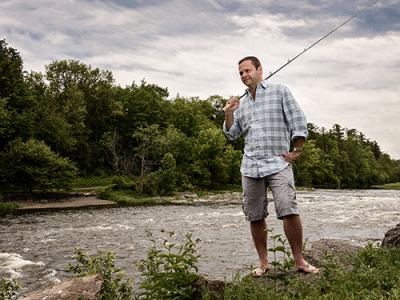
Tyrone Burke, November 16, 2021
Photo credit: Luther Caverly
Carleton’s Steven Cooke Awarded Highly Cited Researcher 2021
For a second year in a row, Environmental Science and Biology Professor Steven Cooke has been named a Highly Cited Researcher for 2021 by Clarivate Analytics. This honour recognizes researchers with multiple publications that rank in the top one per cent of citations in their field in the Web of Science.

Cooke has been producing science to help define the urgency that half of Canada’s freshwater fish species are at risk of extinction despite our numerous lakes and rivers for years. Freshwater ecosystems face many threats that terrestrial and marine ones do—climate change, development, and disruption by extractive industries—in addition to being a valuable resource for agricultural production, drinking water, and generating electricity.
This combination of threats and competing demands creates some unique conservation challenges and Cooke found his approach to science was not generating the results he hoped for. So, the Professor of Fish Ecology and Conservation Physiology began collaborating more. Not only within the lab and across academic disciplines, but with Indigenous knowledge-keepers, commercial fishers, and policy-makers. Over the past year, Cooke estimates that he has had as many as 500 different co-authors on research publications.
That spirit of collaboration is one factor in Cooke being named a Highly Cited Researcher for 2021.
“I have always been fascinated by fish, wanted to help them. But even though I thought I was doing research that was relevant to decision-makers, it was not having impact on the timeframes I thought it should,” says Cooke.
“That pulled my research away from fish a little bit, and into the science-policy interface more broadly. That has led to a lot of good collaborations and research on understanding how knowledge moves—and what decision-makers consider trustworthy. We have used that knowledge to reframe how we do research, so that it has a greater likelihood of having impact. And it is not just specific to our work—we have shared those lessons on how to elevate our game as conservation scientists and do research that is more relevant and usable on anything from pollinators to polar bears.”

The Cooke Lab has about 40 students, staff, and postdoctoral researchers from a wide variety of disciplinary backgrounds. He credits that intellectual diversity with keeping internal discussions intellectually vigorous.
“We are really fortunate to have a diverse group that approaches things in different ways. We have people who are experts in everything from endocrine function in vertebrates to governance structures in environmental organizations. That is pretty disparate, and it makes for a rich training environment,” says Cooke.
“They are all really committed to science and generating actionable knowledge, and I am in awe of what they accomplish. Science can’t be done by one person. It is team science, especially with the type of work that we do.”

Zoological Society Accolade
Cooke was also recently recognized with the 2021 Zoological Society of London Marine and Freshwater Conservation Award, which is awarded for research that has a significant impact on freshwater and marine conservation. Research impact will not necessarily happen organically, and Cooke has been deliberate about integrating into the way The Cooke Lab works—both internally and externally.
“If you do applied research that will be used by others, then they need to be involved in the process. It is not a matter of scientists in lab coats doing what we do, and handing it over to the knowledge users. There is a partnership that needs to start at the beginning. From identifying the questions and the issues through to data collection, interpretation, and application,” says Cooke.
“We call that co-production. Everybody can engage in science, and this approach recognizes that there are different ways of knowing. It might be a commercial fisher who has spent decades on the water learning; it might be an Indigenous elder who has incredible stories passed down in the form of oral histories that are really informative about how the world works. And there is also what policy-makers bring to the table. At the end of the day, they are the ones that need to make the decisions.”
Share: Twitter, Facebook